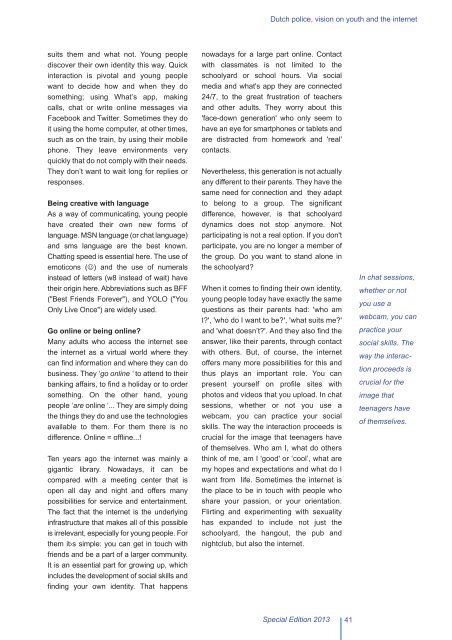ora-schriften-s-2013
ora-schriften-s-2013
ora-schriften-s-2013
You also want an ePaper? Increase the reach of your titles
YUMPU automatically turns print PDFs into web optimized ePapers that Google loves.
Dutch police, vision on youth and the internet<br />
suits them and what not. Young people<br />
discover their own identity this way. Quick<br />
interaction is pivotal and young people<br />
want to decide how and when they do<br />
something; using What’s app, making<br />
calls, chat or write online messages via<br />
Facebook and Twitter. Sometimes they do<br />
it using the home computer, at other times,<br />
such as on the train, by using their mobile<br />
phone. They leave environments very<br />
quickly that do not comply with their needs.<br />
They don’t want to wait long for replies or<br />
responses.<br />
Being creative with language<br />
As a way of communicating, young people<br />
have created their own new forms of<br />
language. MSN language (or chat language)<br />
and sms language are the best known.<br />
Chatting speed is essential here. The use of<br />
emoticons () and the use of numerals<br />
instead of letters (w8 instead of wait) have<br />
their origin here. Abbreviations such as BFF<br />
("Best Friends Forever"), and YOLO ("You<br />
Only Live Once") are widely used.<br />
Go online or being online?<br />
Many adults who access the internet see<br />
the internet as a virtual world where they<br />
can find information and where they can do<br />
business. They ‘go online ‘ to attend to their<br />
banking affairs, to find a holiday or to order<br />
something. On the other hand, young<br />
people ‘are online ‘... They are simply doing<br />
the things they do and use the technologies<br />
available to them. For them there is no<br />
difference. Online = offline...!<br />
Ten years ago the internet was mainly a<br />
gigantic library. Nowadays, it can be<br />
compared with a meeting center that is<br />
open all day and night and offers many<br />
possibilities for service and entertainment.<br />
The fact that the internet is the underlying<br />
infrastructure that makes all of this possible<br />
is irrelevant, especially for young people. For<br />
them it›s simple: you can get in touch with<br />
friends and be a part of a larger community.<br />
It is an essential part for growing up, which<br />
includes the development of social skills and<br />
finding your own identity. That happens<br />
nowadays for a large part online. Contact<br />
with classmates is not limited to the<br />
schoolyard or school hours. Via social<br />
media and what's app they are connected<br />
24/7, to the great frustration of teachers<br />
and other adults. They worry about this<br />
'face-down generation' who only seem to<br />
have an eye for smartphones or tablets and<br />
are distracted from homework and 'real'<br />
contacts.<br />
Nevertheless, this generation is not actually<br />
any different to their parents. They have the<br />
same need for connection and they adapt<br />
to belong to a group. The significant<br />
difference, however, is that schoolyard<br />
dynamics does not stop anymore. Not<br />
participating is not a real option. If you don't<br />
participate, you are no longer a member of<br />
the group. Do you want to stand alone in<br />
the schoolyard?<br />
When it comes to finding their own identity,<br />
young people today have exactly the same<br />
questions as their parents had: 'who am<br />
I?', 'who do I want to be?', 'what suits me?'<br />
and 'what doesn’t?'. And they also find the<br />
answer, like their parents, through contact<br />
with others. But, of course, the internet<br />
offers many more possibilities for this and<br />
thus plays an important role. You can<br />
present yourself on profile sites with<br />
photos and videos that you upload. In chat<br />
sessions, whether or not you use a<br />
webcam, you can practice your social<br />
skills. The way the interaction proceeds is<br />
crucial for the image that teenagers have<br />
of themselves. Who am I, what do others<br />
think of me, am I 'good' or ‘cool’, what are<br />
my hopes and expectations and what do I<br />
want from life. Sometimes the internet is<br />
the place to be in touch with people who<br />
share your passion, or your orientation.<br />
Flirting and experimenting with sexuality<br />
has expanded to include not just the<br />
schoolyard, the hangout, the pub and<br />
nightclub, but also the internet.<br />
In chat sessions,<br />
whether or not<br />
you use a<br />
webcam, you can<br />
practice your<br />
social skills. The<br />
way the interaction<br />
proceeds is<br />
crucial for the<br />
image that<br />
teenagers have<br />
of themselves.<br />
Special Edition <strong>2013</strong><br />
41





